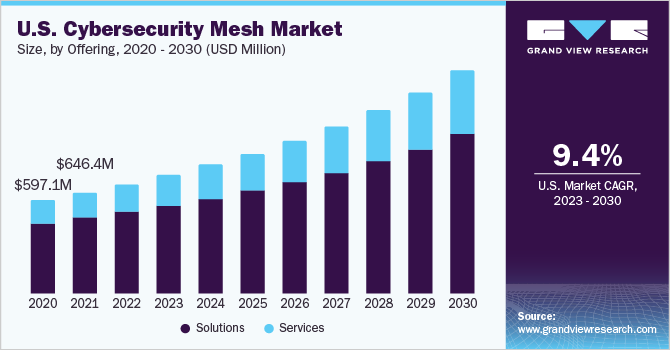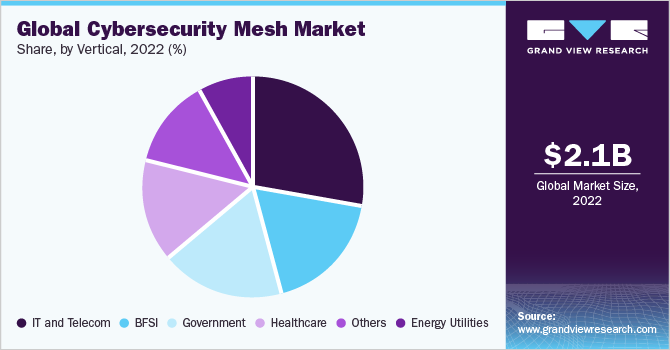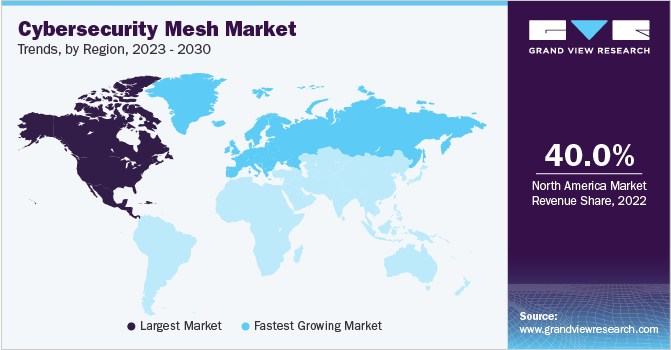- Home
- »
- Network Security
- »
-
Cybersecurity Mesh Market Size, Share, Trends Report, 2030GVR Report cover
![Cybersecurity Mesh Market Size, Share & Trends Report]()
Cybersecurity Mesh Market Size, Share & Trends Analysis Report By Offering (Solutions, Services), By Deployment (Cloud, On-Premise), By Enterprise Size (SMEs, Large Enterprises), By Vertical, By Region, And Segment Forecasts, 2023 - 2030
- Report ID: GVR-4-68040-089-3
- Number of Report Pages: 100
- Format: PDF, Horizon Databook
- Historical Range: 2020 - 2021
- Forecast Period: 2023 - 2030
- Industry: Technology
Report Overview
The global cybersecurity mesh market size was valued at USD 2.13 billion in 2022 and is expected to grow at a compound annual growth rate (CAGR) of 11.1% from 2023 to 2030. The growing demand for the cybersecurity mesh market is created by the rapid expansion and increasing sophistication of cyberattacks as well as the shift of assets to the hybrid multi-cloud. It has become essential for IT managers to use a scalable and composable cybersecurity mesh design to incorporate security products into a collaborative ecosystem. The growing adoption of cybersecurity mesh architecture across company verticals for ensuring secured access to unsecured networks and personal devices is driving the demand for the market across regions. The COVID-19 pandemic has pushed cyber assets outside traditional logical and physical security parameters, thereby making cybersecurity mesh the best workable solution among businesses. This architecture enables businesses to identify security parameters around devices and identities, paving the way for dependable, adaptable, and scalable cybersecurity safeguards. Henceforth, deploying a cybersecurity mesh architecture is a practical solution to secure the safety of assets and endpoints in the post-COVID age while thwarting sophisticated and contemporary threats.

Cybersecurity mesh architecture is a scalable and modular solution to extending security controls, even to widely dispersed assets. Because of its versatility, it is particularly well suited for more modular strategies that are compatible with hybrid multi-cloud systems. A more modular, adaptable, and robust security ecosystem is made possible by Cybersecurity Mesh Architecture (CSMA). A cybersecurity mesh allows technologies to communicate with one another through a number of supporting layers, such as security intelligence, centralized policy management, and identity fabric, as opposed to each security tool operating in a separate silo. These beneficial factors are expected to propel the demand of the market in future years.
Further, with the help of CSMA, people, and machines can securely communicate from various places, across channels, different generations of apps, and hybrid and multi-cloud settings, while all the company's digital assets are protected. This promotes a more constant security posture to support more agility for the composable company. In order to facilitate the integration of security solutions, CSMA offers a number of enabling services, including security analytics, distributed identity fabric, intelligence, automation, and triggers, as well as centralized policy administration and orchestration.
The continuously shifting needs at present cannot be met by the identity and security architectures as they currently stand. All assets, whether they are on-premises, in data centers, or in the cloud, may be secured with the help of CSMA, which helps to offer a standard, integrated security structure and posture. By standardizing how the tools link, CSMA enables standalone solutions to cooperate in complementary ways to enhance overall security posture. For instance, it helps shift control points closer to the assets intended to safeguard and centralizes policy management. These above aspects are anticipated to fuel the demand for the cybersecurity mesh market across regions during the forecast period.
Offering Insights
The solutions segment accounted for the largest market share of 74.0% in 2022. Cybersecurity mesh solutions have been made possible by the emergence of technologies like edge computing, machine learning, and artificial intelligence. These technologies boost the entire security posture by enabling intelligent threat detection, behavior analytics, and automated responses at the edge. Strict regulatory and compliance standards relating to data security and privacy are applicable to many businesses. By applying security controls at the device level, cybersecurity mesh solutions allow organizations to prove compliance with these standards more thoroughly and granularly. This is expected to boost the demand for cybersecurity mesh solutions among the end-use industries over the forecast period.
The services segment is expected to expand at the fastest CAGR of 12.6% over the forecast period. The adoption of cybersecurity mesh services has been affected by the move towards a zero-trust architecture. Zero trust strongly emphasizes every person and device being verified and authorized, regardless of their location or network. Cybersecurity mesh services reduce dependency on network-level security by offering security protections at the individual device level, which aligns with the zero-trust philosophy.
Deployment Insights
The cloud segment accounted for a market share of 64.3% in 2022. Because of the scalability, flexibility, and affordability of cloud computing, businesses are embracing it with increasing frequency. Strong security measures become increasingly important as more vital corporate operations and data are moved to the cloud. With the help of a cybersecurity mesh in the cloud, cloud environments may be secured in a distributed and scalable manner, ensuring that security measures are uniformly applied to all cloud resources.
The on-premise segment is expected to expand at the CAGR of 9.3%. Critical resources and sensitive data are kept in on-premises environments by many organizations. It is essential to safeguard these assets against unauthorized access, data breaches, and insider threats. Cybersecurity mesh in on-premises deployments enables businesses to apply security rules directly to specific endpoints and devices, offering granular protection for vital assets and reducing risks.
Enterprise Size Insights
The large enterprise segment holds the largest market share of more than 64.6% in 2022. Large businesses are frequent targets of cyber assaults because they may contain significant data and resources. Enterprises must employ cutting-edge security measures due to the growing complexity and sophistication of cyber-attacks. Cybersecurity mesh systems provide improved security by putting security controls in place directly on individual devices, allowing for in-the-moment threat detection, reaction, and containment.
The Small & Medium Enterprise (SME) segment is expected to witness a CAGR of 10.5%. Small and Medium-sized (SMEs) businesses are not immune to cyber-attacks, and they are frequently singled out since it is speculated that they may have less robust security measures than bigger companies. SMEs now understand the need for strong cybersecurity measures due to the rising frequency and sophistication of cyberattacks, such as ransomware, phishing, and data breaches. SMEs may protect their digital assets and sensitive data with the help of cybersecurity mesh solutions, which provide them with sophisticated security capabilities.
Vertical Insights
The IT and telecom segment accounts for the largest market share of 26.9% in 2022. Cloud computing and virtualization technologies have been quickly adopted by the IT and telecom sectors to improve agility, scalability, and cost-effectiveness. However, these technologies provide particular security issues, like data privacy, multi-tenancy, and virtual machine vulnerabilities. Cybersecurity mesh solutions offer an integrated security framework to the IT & Telecom sector that covers virtualized infrastructure and cloud environments, enabling consistent security controls and policies to safeguard data and applications. This is expected to surge the demand for the cybersecurity mesh market across the IT and telecom sector.

The healthcare segment is expected to expand with a CAGR of 12.2% over the forecast period owing to the importance of securing patient health records and the healthcare industry's vulnerability to cyberattacks. Ransomware, data breaches, and targeted attacks are just a few examples of rising cyber threats. Organizations in the healthcare industry are aware of the importance of having strong security measures in place to safeguard patient information, vital infrastructure, and treatment continuity. Cybersecurity mesh offers an adaptive and distributed security method to reduce the growing dangers in this area.
Regional Insights
North America dominated the cybersecurity mesh market in 2022 and accounted for 40.0% revenue share. The cyber threat landscape in North America is complex and constantly changing. Attacks on key infrastructure, corporations, government agencies, and people are all increasingly being conducted via cyberspace. Strong cybersecurity measures are essential to safeguard sensitive data, vital systems, and infrastructure. In North America, data breaches have grown to be a big problem, with many high-profile events affecting both corporations and people. The disclosure of private data undermines confidence and causes privacy concerns. Through granular security controls and encryption techniques, cybersecurity mesh solutions assist organizations in protecting sensitive data, assuring data privacy and regulatory compliance.

Europe is anticipated to rise as the fastest developing regional market at a CAGR of 13.0% over the forecast period. Ransomware assaults, data breaches, and targeted attacks are some of the sophisticated cyber dangers that Europe is facing on a regular basis. Government agencies, healthcare providers, financial organizations, and essential infrastructure are just a few organizations that are increasingly targeted. Cybersecurity mesh offers improved security capabilities by offering dispersed security controls, threat intelligence sharing, and incident response coordination to counter these changing threats.
Key Companies & Market Share Insights
To broaden product offering, industry companies utilize a variety of inorganic growth tactics, such as partnerships, regular mergers, and acquisitions. For instance, in September 2021, Palo Alto Networks introduced an business-grade cybersecurity platform called Okyo Garde, for small-sized enterprises and work-from-home employees. This solution helps in addressing risks across the workplace, such as an office cubicle, kitchen table, or a spare bedroom, and is delivered through a premium mesh-enabled Wi-Fi 6 system. Some of the prominent players in the global cybersecurity mesh market include:
-
appNovi
-
ARYAKA NETWORKS,INC.
-
Cato Networks
-
Check Point Software Technologies Ltd.
-
Exium
-
Forcepoint
-
Fortinet, Inc.
-
Ivanti
-
Mesh Security ltd.
-
Naoris Protocol
-
Palo Alto Networks
-
Quasius Investment Corp. GCA
-
SailPoint Technologies, Inc.
-
SonicWall
-
Zscaler
Cybersecurity Mesh Market Report Scope
Report Attribute
Details
Market size value in 2023
USD 2.35 billion
Revenue forecast in 2030
USD 4.90 billion
Growth Rate
CAGR of 11.1% from 2023 to 2030
Base year for estimation
2022
Historical data
2020 - 2021
Forecast period
2023 - 2030
Quantitative units
Revenue in USD billion and CAGR from 2023 to 2030
Report coverage
Revenue forecast, company market share, competitive landscape, growth factors, and trends
Segments covered
Offering, deployment, enterprise size, vertical, region
Regional scope
North America; Europe; Asia Pacific; Latin America; Middle East & Africa
Country scope
U.S.; Canada; Germany; UK; France; Italy; Spain; China; India; Japan; South Korea; Australia; Brazil; Mexico; Argentina; U.A.E.; Saudi Arabia; South Africa
Key companies profiled
appNovi; ARYAKA NETWORKS,INC.; Cato Networks; Check Point Software Technologies Ltd.; Exium; Forcepoint; Fortinet, Inc.; Ivanti; Mesh Security ltd.; Naoris Protocol; Palo Alto Networks; Quasius Investment Corp. GCA; SailPoint Technologies, Inc.; SonicWall; and Zscaler
Customization scope
Free report customization (equivalent to up to 8 analysts working days) with purchase. Addition or alteration to country, regional & segment scope.
Pricing and purchase options
Avail customized purchase options to meet your exact research needs. Explore purchase options
Global Cybersecurity Mesh Market Report Segmentation
This report forecasts revenue growth at global, regional, and country levels and provides an analysis of the latest industry trends in each of the sub-segments from 2020 to 2030. For the purpose of this study, Grand View Research has segmented the global cybersecurity mesh market report based on offering, deployment, enterprise size, vertical, end use, and region:
-
Offering Outlook (Revenue, USD Billion, 2020 - 2030)
-
Solutions
-
Services
-
-
Deployment Outlook (Revenue, USD Billion, 2020 - 2030)
-
Cloud
-
On-premise
-
-
Enterprise Size Outlook (Revenue, USD Billion, 2020 - 2030)
-
Small And Medium-Sized Enterprises (SMEs)
-
Large enterprises
-
-
Vertical Outlook (Revenue, USD Billion, 2020 - 2030)
-
BFSI
-
Healthcare
-
Energy Utilities
-
IT and Telecom
-
Government
-
Others
-
-
Regional Outlook (Revenue, USD Billion, 2020 - 2030)
-
North America
-
U.S.
-
Canada
-
-
Europe
-
UK
-
Germany
-
France
-
Italy
-
Spain
-
-
Asia Pacific
-
China
-
India
-
Japan
-
Australia
-
South Korea
-
-
Latin America
-
Brazil
-
Mexico
-
Argentina
-
-
Middle East & Africa
-
U.A.E
-
Saudi Arabia
-
South Africa
-
-
Frequently Asked Questions About This Report
b. The global cybersecurity mesh market size was estimated at USD 2.13 billion in 2022 and is expected to reach USD 2.35 billion in 2023.
b. The global cybersecurity mesh market is expected to grow at a compound annual growth rate of 11.1% from 2023 to 2030 to reach USD 4.90 billion by 2030.
b. North America dominated the cybersecurity mesh market with a share of over 40.0% in 2022, owing to the growing cyber attacks on key infrastructure, corporations, government agencies, and people.
b. Some key players operating in the cybersecurity mesh market include appNovi, ARYAKA NETWORKS,INC., Cato Networks, Check Point Software Technologies Ltd., Exium, Forcepoint, Fortinet, Inc., Ivanti, Mesh Security ltd., Naoris Protocol, Palo Alto Networks, Quasius Investment Corp. GCA, SailPoint Technologies, Inc., SonicWall, and Zscaler.
b. Key factors that are driving the cybersecurity mesh market growth include the rapid expansion and increasing sophistication of cyberattacks as well as the shift of assets to the hybrid multi-cloud.
Share this report with your colleague or friend.
![gvr icn]()
NEED A CUSTOM REPORT?
We can customize every report - free of charge - including purchasing stand-alone sections or country-level reports, as well as offer affordable discounts for start-ups & universities. Contact us now
![Certified Icon]()
We are GDPR and CCPA compliant! Your transaction & personal information is safe and secure. For more details, please read our privacy policy.
We are committed towards customer satisfaction, and quality service.
"The quality of research they have done for us has been excellent."





